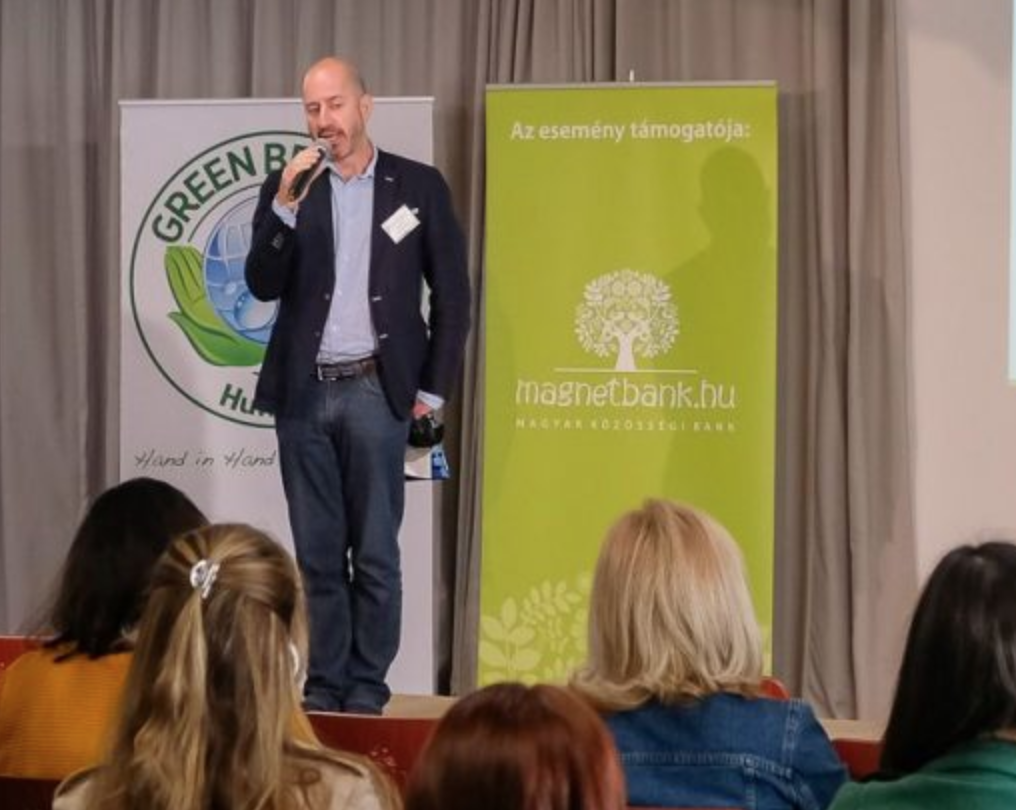
Training for Certified Sustainability Managers
The inaugural event of the Sustainability Manager Basic Training, a joint training programme of GREEN BRANDS Hungary and MagNet Hungarian Community Bank, was held with great interest. On 26 May, more than 80 participants gathered at the MagNet Community House to learn from the 9 lectures of the event about the theoretical basis and practical advice on how to make their own brands sustainable.
The organisers were particularly pleased to host one of the first, if not the first, business events in Hungary after the “reopening”, giving the country’s economy a symbolic green start.
András Wiszkidenszky, Regional Director of GREEN BRANDS, welcomed the guests. In his opening presentation he presented the history of sustainability from preindustrial times. Through the ideas of Hume, Rousseau, Ehrlich, Commoner and Schumacher, we learned how the concept of sustainability, which is now taken for granted, has evolved over the centuries. The audience was introduced to the economics of sustainability, and then András anticipated the economic solutions (eco-cyclical processes, shorter supply chains, renewable energy instead of fossil fuels, second-best-world practices) that were further elaborated by the speakers who followed him.
In the second presentation, Attila Maxim Ferenczi, Managing Director of RECOBIN Ltd. and jury member of GREEN BRANDS Hungary, spoke about how to link the workplace and the circular economy. He stressed that climate change is a complex, multi-stakeholder problem in which individuals, companies, intermediaries and the state all have a responsibility. Ideally, he said, companies should adopt a complex, facility-management approach to waste management, which would help them achieve the ambitious 2035 recycling targets set by the European Union. He also suggested to those present “end-of-pipe” (non-consumption, environmentally conscious purchasing, sustainable use) and “end-of-pipe” (recycling, reuse) solutions to move their companies in a greener direction.
Attila was followed on stage by Gusztáv Czöndör, owner-CEO of ENCO Group. After explaining the three pillars of energy management (technical, economic, energy law), Gusztáv outlined what a company’s energy management goals should look like. He also gave examples of greenwashing in the form of case studies, and presented a wide range of energy consulting and procurement services, from which, with the right professional help, we can green the energy our companies use.
After a short coffee break, the next block was opened by Zoltán Krázli, GS1 Hungary’s leading expert, who spoke about the implementation of carbon-free logistics. First of all, Zoltán pointed out the importance of measurement and data collection, which is a basic requirement for sustainable logistics. The Lean&Green programme he presented and the related common standard system advocates this and achieves efficient, safe and sustainable supply chains through cooperation between business actors.
Zoltan was followed by Dr. Orsolya Diófási-Kovács, Assistant Professor at the Corvinus University of Budapest. In her presentation of the circular economy model, Orsolya particularly emphasised the “everyone buys” principle, drawing attention to supply chain thinking. The audience was introduced to the categorisation of eco-labels and how to use them as a consumer or a company.
Then Greta Nagy, owner-manager of DANDELION Ltd. gave her presentation “GDP vs. Biocapacity”. In the first half of the thought-provoking presentation, Greta highlighted the limitations of GDP and other commonly used metrics.
After lunch, Gábor Lévai, Managing Director of GREEN BRANDS Hungary, gave the first presentation. He gave us an insight into the world of social impact measurement, its theoretical background (triple bottom line) and its goals (prove and improve). Gábor presented a number of tools (PWC-TIMM, KMPG-True Value, B Corp, MagNet Impact Scorecard) to quantify the impact of your company on the environment around it.
Zsombor Barta, President of the Hungarian Green Building Association (HuGBC), was responsible for presenting the sustainability aspects of our built environment. In his presentation, Mr Zsombor pointed out the responsibility of the real estate market players in the fight against climate change.
Finally, Zsófia Lakatos, Managing Director of Emerald PR, hereditary member of the Hungarian Public Relations Association and jury member of GREEN BRANDS Hungary, took the stage. If a company is already green, it is worth communicating about it, was the basic message. Zsófi provided the participants with strategic tools and sure tips, golden rules.
Csaba Molnár, Director of Community Development at MagNet Bank, closed the day-long series of presentations. In his speech, he said how pleased he was that the Hamvas Hall, the venue for the event, was filled with life for the first time this year, and how important he considers the training of professionals who understand corporate sustainability to be.
The success of the inaugural event shows that there is an increasing demand for green business in Hungary, which requires the widespread dissemination of quality knowledge and good practices. Therefore, GREEN BRANDS Hungary and MagNet Bank will continue to develop the curriculum of the Sustainability Manager Basic Training and are planning to launch the multi-month training in November.